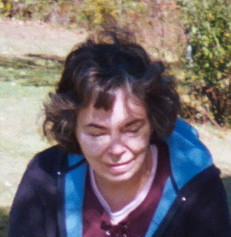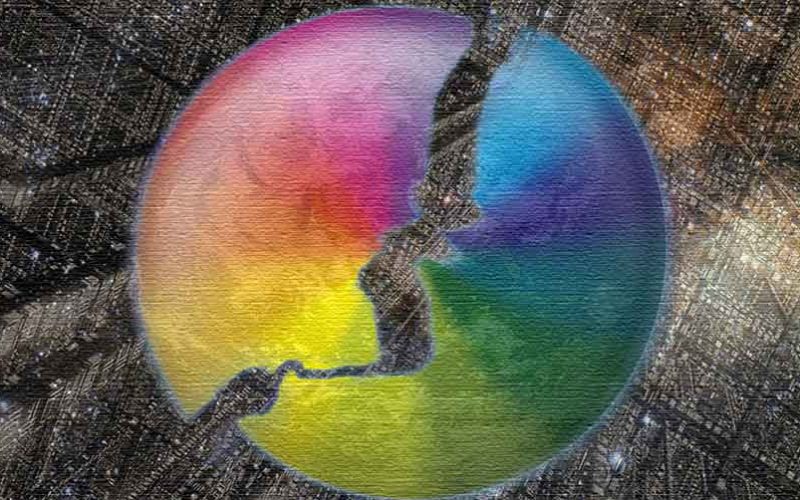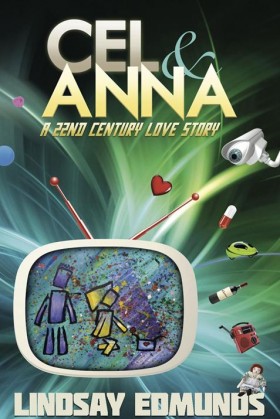The worst thing about virtual sex in the Middle Machine Age was the bunny suit.
There’s an impressive opening line (for a book I mean). Would you read more?
I did. And it rekindled my passion for speculative fiction. The book is Cel & Anna: A 22nd Century Love Story by late-blooming novelist Lindsay Edmunds.
To set the stage:
You are about to enter the Middle Machine Age, where good citizens of the Reunited States are either Outsiders or denizens of the UnderWorld. Things are in uneasy balance, like a fantastic house of cards that grows ever taller.
Then comes a datastorm called The Emperor Worm. This vortex of electronic garbage smashes everyone’s house of cards. Anna Ringer, a troubled employee of a mysterious company called Lighthorse Magic, finds herself at a hinge in history. If she fails to act, something strange and marvelous will die. If she does act, she may die herself.
The Next Thing is not what you think.
So Lindsay, what more can you tell us without giving it all away?
A very short synopsis of Cel & Anna: A guy and a computer both fall in love with a girl. Interesting times ensue.
In our correspondence you said that you haven’t really read speculative fiction since your 20s. What inspired you to write Cel & Anna?
All of the following played a part:
I have owned Macs for more than 20 years. Something about Macs, especially the earlier models, inspires my imagination.
When I began the novel, I lived in the Washington, DC, area. Over the main interstate from the north, I-270, was a billboard showing the color-coded terrorism alert for the day. I don’t know whether it is still there.
Back in one of my other lives, I wrote my thesis on Emily Dickinson’s use of fantasy in her poetry. Its name is “Emily Dickinson’s Wonderland.”
The first books I loved as a child were fantasies and fairy tales. I continued to read these kinds of stories through my twenties. When I stopped reading them was when I put aside my literary ambitions. This probably was not coincidental.
Since this is Later Bloomer, hope I’m not giving it away by mentioning you published Cel & Anna at 58 :). What other lives have you lived?
Yeesh, seeing in print my age when I published Cel & Anna makes me want a stiff drink. On the other hand, making a dream come true at any age is reason to celebrate. Open the champagne!
But back to your question: I was an English major and for a time worked and academia. It did not take. Also held various jobs in Washington, DC, including the one I still have: self-employed medical/pharmaceutical editor. However, I live a rural/suburban life in southwestern Pennsylvania now.
When I was 45, I was diagnosed with a benign brain tumor. I had surgery and recovered completely, which makes every day rather lucky when you think about it.
So glad you’re okay and it brought you back to writing. How long did you work on Cel & Anna?
I worked on it in a serious and committed way for 3+ years.
You’re an editor by trade, yet you hired someone to edit Cel & Anna. Why?
Nobody can edit their own work because they are too close to it. Cel & Anna’s brilliant editor, Jill Groce, saw so much that I did not.
Any sequels planned? Do you have a new book in the offing?
I am working on the sequel to Cel & Anna, which is going well when I can give it the hours it demands.
I have an idea for another short story featuring a character in the sequel named Beltzhoover the Vast.
So happy to hear that! I love these characters. Do you keep to a writing schedule?
In a perfect world, I write in the mornings between about 7:30 and 11:30.
However, I often get my best ideas after I stop writing, including some that come at inconvenient times like four in the morning.
Are you a pantser (someone who writes by the seat of their pants) or a plotter?
I try desperately to be a plotter. I write outlines with care and thought. I have a wonderful one written out in longhand for the sequel to Cel & Anna. I will follow some of it. The structure is not classic. I envision where I want a story to end up. Then I figure out how to get there.
But when I sit down to write a story, the pantser takes over. Improvisation rules the day.
In 1938 Brenda Ueland published a book called If You Want To Write, in which she said that the worst sin a writer could commit was to be boring. That is wise counsel. I try to heed it.
If you could invite any five literary personages from any time period to dinner, who would they be?
- Emily Dickinson, because I think she would be fascinating company at a dinner party.
- Russell Hoban, author of Turtle Diary, Riddley Walker, the Frances series for children, and many other books. I quoted a line from Turtle Diary in the acknowledgments section of Cel & Anna.
- Anne Sneller, who published her luminous memoir A Vanished World at age eighty.
- Shirley Jackson, because I have been a fan since I was nine.
- Brenda Ueland, author of If You Want to Write, who must have been a great and inspiring teacher.
What are you reading at the moment?
I just finished a terrific new book called Results Not Typical: A Novel by the Irish writer Catherine Ryan Howard. It takes a satirical look at the commercial weight loss industry. In addition to being just plain funny, it has a satisfying conclusion. I appreciated that. A novel’s conclusion is the hardest part to get right.
 So true. Thanks for visiting Later Bloomer, Lindsay, and inspiring us with your story!
So true. Thanks for visiting Later Bloomer, Lindsay, and inspiring us with your story!
You can find Lindsay at her blog and on Twitter. [I am so saddened to report that Lindsay passed away in July 2017. —Debra]

